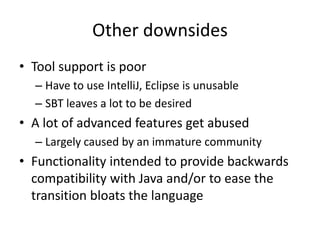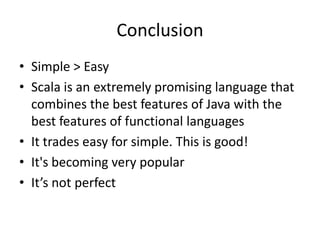Intro to scala
- 1. Intro to
- 2. A Next-Gen Architecture "Manifesto" âĒ There should be a minimal amount of boilerplate âĒ The most common programming tasks should be simple âĒ It should take advantage of permanent hardware trends: â Multi-core CPUs â Vertical scalability â Cloud-computing â Horizontal scalability âĒ Preference for JVM and statically typed languages âĒ It should be enjoyable to use
- 3. Introducing Scala âĒ Functional â Functions are first class entities â Immutability is the default â Deterministic â Lends itself to concurrent programming âĒ But also, object oriented â Can code like Java if you want, but youâre not supposed to!!!! âĒ Very concise â free of much of the boilerplate code âĒ Type safe â VERY type safe âĒ Runs on the JVM â Fully interoperable with Java
- 5. Popularity âĒ 12th most popular language in the world and rising quickly â Java holding at #2, but slipping on the web â Python = 4, Groovy = 20, Clojure = 21 âĒ Becoming popular at large companies â Twitter, Amazon, IBM, LinkedIn, LivingSocial, tomtom âĒ A lot of the same cast of characters â James Gosling, Rod Johnson et al. are on the board
- 6. POJOs Java Scala public class User { case class User(val userName: String, private final String userName; val password: String) private final String password; public User(final String userName, final String password) { this.userName = userName; this.password = password; } public String getUserName() { return this.userName; } public String getPassword() { return password; } // operators }
- 7. Overloading and Polymorphism Java Scala void doSomething(int x, int y, int z)âĶ def doSomething(x=true, y=true, z=true) = âĶ void doSomething(int x, int y){ // USAGE this.doSomething(x, y, true); doSomething(y = false) } void doSomething(int x){ this.doSomething(x, true, true) } void doSomething(){ this.doSomething(true, true, true) }
- 8. Traits trait Ordered[A] { /** Result of comparing this with operand that. * returns x where * x < 0 iff this < that * x == 0 iff this == that * x < 0 iff this > that */ def compare(that: A): Int def < (that: A): Boolean = (this compare that) < 0 def > (that: A): Boolean = (this compare that) > 0 def <= (that: A): Boolean = (this compare that) <= 0 def >= (that: A): Boolean = (this compare that) >= 0 def compareTo(that: A): Int = compare(that) }
- 9. Type Safety Java Scala // Query for active users whose name // Query for active users whose name // is "Joe" // is "Joe" final String nameParam = "Joe" val nameParam = "Joe" final String hql = "from " + userTable.where(user => User.class.getName() + user.name === nameParam and " where name = :name AND" + user.status === Status.Active)) " and status = :status" final Query query = createQuery(hql); query.setParameter("name", "joe"); query.setParameter("status", User.Status.ACTIVE.name()); return query.list();
- 10. Pattern Matching class Animal(name: String, age: Int) case class Cat(name: String, age: Int) extends Animal(name, age) case class Dog(name: String, age: Int, val breed: String) extends Animal(name, age) val animal: Animal = âĶ animal match { case x: Dog => println("You have a dog of type " + x.breed) // THIS COMPILES case Cat(name, age) => println("You have a cat named " + name) println(s"He is $age years old") // Fancypants string interpolation case _ => println("You have some kind of unknown animal") }
- 11. Higher Order Functions Java Scala // return all photos > 10k // return all photos > 10k List<Photo> input=Arrays.asList(...); val photos = List(...) List<Photo> output = new ArrayList(); val output = for (Photo c : input){ photos.filter(p => p.sizeKb > 10) if(c.getSizeInKb() > 10) { output.add(c); } // OR } val output=photos.filter(_.sizeKb > 10)
- 12. Concurrency Java Scala // divide the list into two sub-lists // as determined by some function val myFunc = âĶ val (l1, l2) = photos.partition(myFunc) // but what if myFunc does a big, // expensive operation? ??? val (l1, l2) = photos.par.partition(myFunc)
- 13. That all sounds great, BUTâĶâĶ.
- 14. It's hard to read *Especially in the beginning def + + [B>: A, That] (that: TraversableOnce [B]) (implicit bf: CanBuildFrom [List [A], B, That]): That âĒ Functional and imperative programming support = 2 languages in 1 âĒ Learning Scala is like learning 2 languages
- 15. Power comes at the cost of ease of use "Computer programing for everybody" -- Guido van Rossum "My goal is for Scala to be the language of choice for the smart kids" -- Martin Odersky
- 16. Other downsides âĒ Tool support is poor â Have to use IntelliJ, Eclipse is unusable â SBT leaves a lot to be desired âĒ A lot of advanced features get abused â Largely caused by an immature community âĒ Functionality intended to provide backwards compatibility with Java and/or to ease the transition bloats the language
- 17. Conclusion âĒ Simple > Easy âĒ Scala is an extremely promising language that combines the best features of Java with the best features of functional languages âĒ It trades easy for simple. This is good! âĒ It's becoming very popular âĒ Itâs not perfect
Editor's Notes
- Deterministic means free of side effectsTwo languages in one means a lot to learn
- 80% of all .equals methods are implemented incorrectly
- Mention type inference also
- What happens if you change name to userName
- Mention overloading also
- Mention overloading also



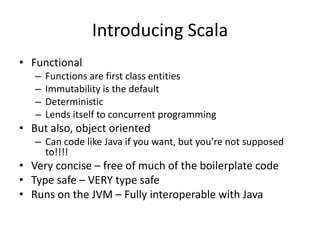




![Traits
trait Ordered[A] {
/** Result of comparing this with operand that.
* returns x where
* x < 0 iff this < that
* x == 0 iff this == that
* x < 0 iff this > that
*/
def compare(that: A): Int
def < (that: A): Boolean = (this compare that) < 0
def > (that: A): Boolean = (this compare that) > 0
def <= (that: A): Boolean = (this compare that) <= 0
def >= (that: A): Boolean = (this compare that) >= 0
def compareTo(that: A): Int = compare(that)
}](https://image.slidesharecdn.com/introtoscala-130215204723-phpapp01/85/Intro-to-scala-8-320.jpg)


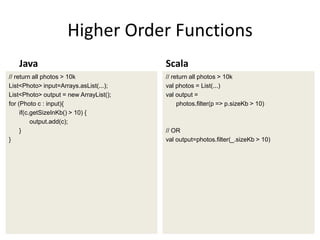
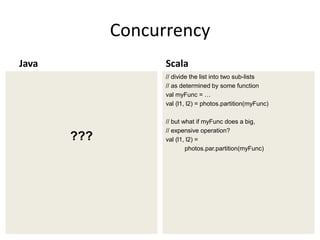

![It's hard to read
*Especially in the beginning
def + + [B>: A, That] (that: TraversableOnce [B])
(implicit bf: CanBuildFrom [List [A], B, That]): That
âĒ Functional and imperative programming support =
2 languages in 1
âĒ Learning Scala is like learning 2 languages](https://image.slidesharecdn.com/introtoscala-130215204723-phpapp01/85/Intro-to-scala-14-320.jpg)

